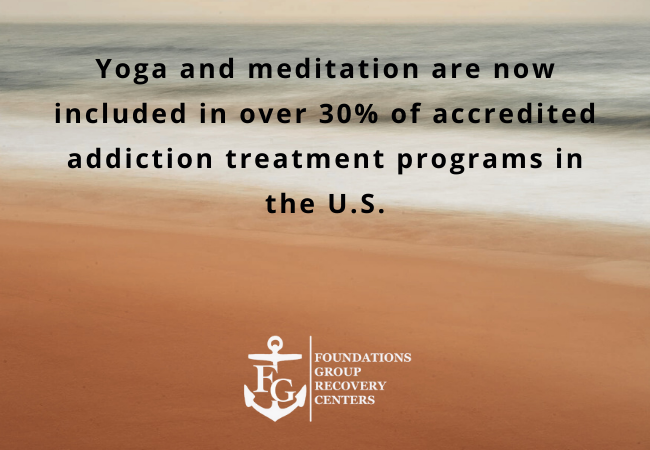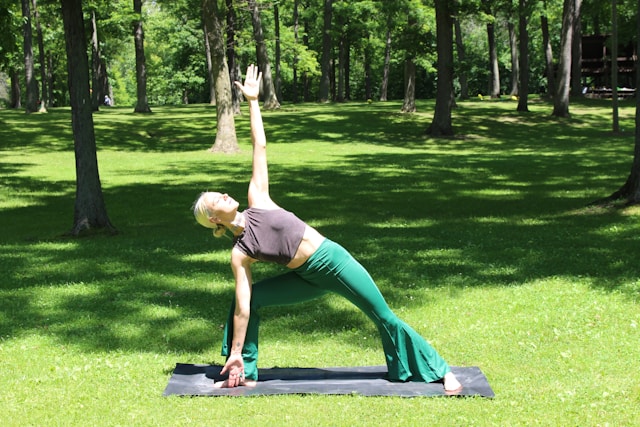Recovery is not just about abstaining from substances—it’s about restoring your health, rebuilding your life, and reconnecting with yourself. Many people in recovery are discovering that while traditional therapy lays the foundation, integrating holistic practices like yoga, meditation, and nutrition offers lasting tools for growth, stability, and joy.
At Foundations Group Recovery Centers, our Holistic Addiction Treatment Program in Massachusetts weaves these practices into every level of care—from early stabilization after Alcohol & Drug Detox in Massachusetts, to continued healing through Day Treatment Programs and Outpatient Addiction Treatment in Massachusetts. The result is a deeply supportive, whole-person recovery experience designed for long-term success.
Why Holistic Healing Matters for Long-Term Sobriety
Addiction impacts every part of a person’s being—physically, emotionally, mentally, and spiritually. While clinical interventions like CBT, DBT, and group therapy address the cognitive and behavioral aspects of addiction, holistic therapies help restore balance to the body and nervous system, rebuild emotional resilience, and foster a renewed connection with one’s sense of self and purpose.
Benefits of Integrating Holistic Care:
- Enhances self-regulation and stress response
- Repairs the physical damage caused by substance use
- Offers new ways to manage cravings and triggers
- Fosters long-term habits of self-care and wellness
In our Addiction Treatment Programs in Massachusetts, we’ve seen how these practices empower individuals not only to stay sober—but to feel healthier, calmer, and more confident in their recovery journey.
Yoga for Addiction Recovery: Movement That Heals
Yoga is a proven therapeutic tool in addiction treatment. It offers far more than stretching—it’s a somatic therapy that helps individuals reconnect with their bodies, calm the mind, and process trauma without words.
How Yoga Supports Sobriety:
- Reduces Cortisol and Stress Hormones: Chronic stress is a key relapse trigger. Yoga activates the parasympathetic nervous system, calming the fight-or-flight response.
- Improves Interoception: Addiction often disconnects people from their bodies. Yoga helps restore this connection, allowing people to better sense internal cues like anxiety or emotional discomfort.
- Increases Dopamine Naturally: Yoga supports the body’s ability to produce its own feel-good chemicals like dopamine and serotonin—often depleted by substance use.
- Supports Trauma Recovery: Yoga allows trauma to be processed through movement and breath, bypassing the need for verbal processing when emotions are too overwhelming.
At Foundations Group, yoga is an integral part of our Half Day Treatment Program in Massachusetts, helping clients feel grounded and safe as they heal.
Common Recovery Yoga Poses & Their Benefits:
- Mountain Pose (Tadasana): Establishes strength and stillness
- Warrior Poses: Build physical and emotional resilience
- Cat-Cow Stretch: Encourages breath and spine mobility
- Savasana (Corpse Pose): Teaches surrender, stillness, and reflection
- Child’s Pose: Offers deep rest and comfort during emotional release
Each session is tailored to the emotional tone of the day, ensuring that yoga complements both individual and group therapy work.
Meditation: Rewiring the Brain for Sobriety
Meditation is more than just a relaxation technique—it’s a brain-training tool proven to change the way individuals think, feel, and respond to stress. Mindfulness and meditation help create the mental space necessary to make conscious, healthy decisions—especially in high-risk situations.
Benefits of Meditation in Recovery:
- Improves Emotional Regulation: Clients learn to observe emotions without reacting impulsively.
- Reduces Rumination: Mindfulness helps break the cycle of negative thinking that often leads to relapse.
- Enhances Brain Plasticity: Meditation strengthens the prefrontal cortex, which is responsible for judgment and decision-making.
- Interrupts Craving Cycles: Awareness practices help clients notice the urge without acting on it.
- Increases Compassion and Forgiveness: Meditation supports inner healing and self-acceptance, which are crucial after years of guilt, shame, or trauma.
In our Outpatient Addiction Treatment in Massachusetts, clients are guided in simple, accessible practices like:
- Mindful breathing
- Body scans
- Visualization
- Loving-kindness meditations
We often pair meditation with yoga, trauma work, or relapse prevention groups to reinforce new skills and help regulate the nervous system.
The Foundation of Physical and Mental Wellness
Long-term substance use takes a serious toll on the body. From malnutrition and liver damage to blood sugar instability and brain fog, the physical side effects of addiction are often overlooked. That’s why restorative nutrition is a cornerstone of our Holistic Addiction Treatment Program in Massachusetts.
How Nutrition Supports Recovery:
- Replenishes Depleted Nutrients: Alcohol, opioids, and stimulants rob the body of B vitamins, magnesium, zinc, and amino acids essential for brain and immune function.
- Stabilizes Blood Sugar: Fluctuations in blood glucose can cause irritability, anxiety, and cravings—often mistaken for emotional relapse symptoms.
- Supports Neurochemical Balance: Healthy fats and proteins provide the building blocks for serotonin, dopamine, and endorphins.
- Heals the Gut-Brain Axis: 90% of serotonin is made in the gut. Probiotics, fiber, and nutrient-dense foods restore digestive health and support mood stability.
Smart Food Choices for Long-Term Sobriety:
- Lean proteins (chicken, tofu, fish): Build neurotransmitters and promote satiety
- Complex carbs (quinoa, oats, brown rice): Support stable energy and brain function
- Leafy greens and cruciferous vegetables: Detoxify and support liver repair
- Omega-3 fats (salmon, flaxseed, walnuts): Improve cognitive function and reduce depression
- Probiotic foods (yogurt, kimchi, kombucha): Support gut-brain health and reduce inflammation
Our clinical team collaborates with each client to ensure their nutritional needs are met—and that they leave treatment with the tools to continue eating well independently.

How These Practices Come Together in Day Treatment
Our Day Treatment Programs in Massachusetts integrate these wellness practices into your daily clinical schedule, providing a well-rounded approach that treats both body and mind.
A Sample Day Might Include:
| Time | Activity |
|---|---|
| 9:00 AM | Group therapy: Identifying triggers |
| 10:00 AM | Yoga session with mindfulness and breathing |
| 11:00 AM | Individual counseling |
| 12:00 PM | Nutrient-rich lunch + recovery nutrition discussion |
| 1:00 PM | Guided meditation or body scan |
| 2:00 PM | Relapse prevention skills workshop |
By experiencing these practices in a consistent, therapeutic setting, clients learn to make them part of their long-term recovery toolkit.
Why Foundations Group Is Different
At Foundations Group Recovery Centers, we don’t just help you stop using—we help you reclaim your life through a balance of science-backed therapy and holistic wellness. Here’s what you can expect from our approach:
- Licensed clinical therapists and trauma specialists
- Certified yoga and mindfulness instructors
- Personalized nutrition support and wellness planning
- Dual diagnosis care for co-occurring mental health conditions
- Seamless transitions between detox, day treatment, and outpatient care
If you’re looking for an Addiction Treatment Center in Massachusetts that cares for your entire being, you’ve found your home here.
Conclusion
Sobriety is just the beginning. Real recovery means learning how to live well—physically, mentally, emotionally, and spiritually. By incorporating yoga, meditation, and nutrition into your treatment plan, you’re not just avoiding relapse. You’re creating a life that you want to stay sober for.
Call Foundations Group Recovery Centers today at 844.763.4966 to discover how our integrative approach can support your long-term recovery journey.
Frequently Asked Questions (FAQ)
How does yoga help with addiction recovery?
Yoga supports addiction recovery by reducing stress, calming the nervous system, and helping individuals reconnect with their bodies. It teaches mindful movement and breath control, which are powerful tools for managing cravings, anxiety, and trauma-related symptoms.
Can meditation really prevent relapse?
Yes. Mindfulness meditation has been shown to reduce relapse risk by helping individuals respond to cravings and emotional triggers with awareness instead of impulsivity. It strengthens emotional regulation and builds mental clarity—key for long-term sobriety.
Why is nutrition important after addiction?
Substance use often depletes the body of vital nutrients and damages gut health. Nutrition restores physical balance, supports brain function, stabilizes mood, and reduces the physical symptoms that can lead to relapse, such as fatigue, irritability, or poor sleep.
What if I’ve never done yoga or meditation before?
No experience is necessary. At Foundations Group Recovery Centers, our instructors and therapists gently guide clients through beginner-friendly practices. Everything is adapted to your comfort level and physical ability.
Is this kind of holistic support available in outpatient care?
Yes. We integrate yoga, meditation, and nutrition education into our Outpatient Addiction Treatment in Massachusetts and Half Day Treatment Program in Massachusetts, making holistic healing accessible at every level of care.

